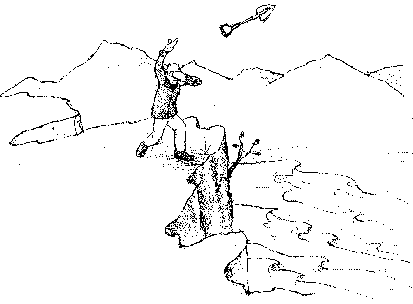Buddhist Tales for Young and Old
Volume 2 - King Fruitful
The Shovel Wise Man [Renunciation]
Once upon a time, the Enlightenment Being was born into a family of vegetable gardeners. After he grew up he cleared a patch of land with his shovel. He grew herbs, pumpkins, melons, cucumbers and other vegetables. These he sold to earn a humble living.
The shovel was his one and only possession in the whole world. He carried it in the same way a forest monk carries his walking staff. So he became known as the ‘Shovel Wise Man’.
One day he thought, “What good does it do me to live the ordinary everyday life of a gardener? I will give up this life and go meditate in the forest. Then I will be peaceful and happy.” So the Shovel Wise Man hid his one possession, his shovel, and became a forest meditator.
Before too long, he started thinking about his only possession, his shovel. He was so attached to this shovel that he couldn’t get it out of his mind, no matter how hard he tried! Trying to meditate seemed useless, so he gave it up. He returned to his shovel and his ordinary life as a vegetable gardener.
Lo and behold, in a little while the Shovel Wise Man again gave up the everyday life, hid his shovel and became a forest meditator. Again he could not get his shovel out of his mind, and returned to being a gardener. All in all, this happened six times!
The next time the Shovel Wise Man gave up his forest meditation, he finally realised it was because of his old worn out shovel that he had gone back and forth seven times! So he decided to throw it away, once and for all, in a deep river. Then he would return to the forest for good.
He took his shovel down to the riverbank. He thought, “Let me not see where this shovel enters the water. Otherwise it may tempt me again to give up my quest.” So he closed his eyes, swung the shovel in a circle over his head three times, and let it fly into the midst of the river. Realising that he would never be able to find the shovel again, he shouted, just like a lion roars, “I have conquered! I have conquered! I have conquered!”
It just so happened that the King of Benares was riding by at that very moment. He was returning from putting down a revolt in a border village. He had bathed in the river, and had just seated himself on his magnificent royal elephant. He was riding back to Benares in a victory procession.

When he heard the triumphant shouts of the Enlightenment Being, he said to his ministers, “Listen. Who is shouting, just like a lion roars, ‘I have conquered’? Whom has he conquered? Bring that man to me!”
When they brought the Shovel Wise Man to him, the king said, “I am a conqueror because I have won a battle. You say that you have conquered. Whom did you conquer?”
The Enlightenment Being replied, “Your lordship, even if you conquer a hundred thousand armies, they are meaningless victories if you still have unwholesome thoughts and desires in your own mind! By conquering the craving in my mind, I know I have won the battle against unwholesome thoughts.”
As he spoke he concentrated his mind on the water in the river, then on the idea of water itself, and reached a high mental state. In a sitting position he rose into the air. He preached these words of Truth to the king: “Defeating an enemy who returns to fight you again and again is no real victory. But if you defeat the unwholesomeness in your own mind, no one can take that true victory from you!”
While the king was listening to these words, all unwholesome thoughts left his mind. It occurred to him to give up the ordinary world and seek real peace and happiness. He asked, “Where are you going now, wise one?” He answered, “I am going to the Himalayas, oh king, to practise meditation.” The king said, “Please take me with you. I too wish to give up the common worldly life.” Lo and behold, as the king turned northward with the Shovel Wise Man, so did the entire army and all the royal ministers and attendants.
Soon the news reached the people of Benares that the king and all those with him were leaving the ordinary world and following the Shovel Wise Man to the Himalayas. Then all the people in the entire city of Benares followed them towards the northern mountains. Benares was empty!
This great migration of people came to the attention of the god Sakka, King of the Heaven of 33. Never had he seen so many giving up worldly power. He ordered the architect of the gods to build a dwelling place in the Himalayan forests for all these people.
When they arrived in the Himalayas, the Shovel Wise Man was the first to announce that he had given up the ordinary world for good. Then all those with him did the same. Never was so much worldly power given up, or renounced, at the same time.
The Shovel Wise Man developed what holy man call the ‘Four Heavenly States of Mind’. First is loving-kindness, tender affection for all. Second is feeling sympathy and pity for all those who suffer. Third is feeling happiness for all those who are joyful. And the fourth state is balance and calm, even in the face of difficulties or troubles.
He taught the others advanced meditation. With great effort they all gained high mental states, leading to rebirth in heaven worlds.

